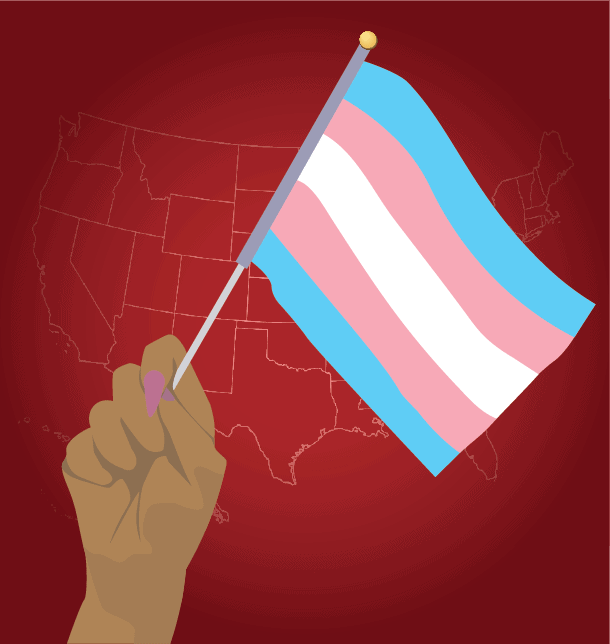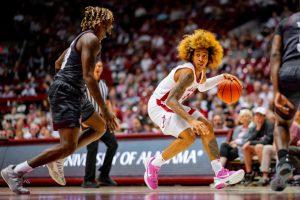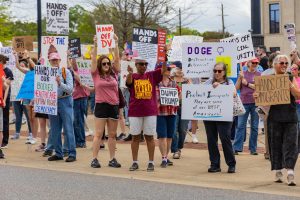Trans students lack visibility at UA
April 10, 2022
This year, 35 states have proposed anti-trans legislation, with five bills introduced in Alabama and two signed into law.
Alabama legislation
Gov. Kay Ivey signed Senate Bill 184 and House Bill 322 into law on April 8. SB 184 bans medical care and assistance for transgender patients, while HB 322 requires K-12 students to go the restroom corresponding with their sex assigned at birth. HB 322 also limits LGBTQ content in classes.
Alabama’s House Bill 266 would put a felony ban on healthcare for trans minors. The bill passed the Senate committee on Feb. 22.
Rep. Neil Rafferty, the only openly gay member of the Alabama State Legislature, called the Republican-sponsored bill, SB 184, “invasive” and an affront to conservative “small government” values on the final day of the legislative session debating the anti-trans bills.
“It’s hard enough growing up being different,” Rafferty said. “It’s even harder growing up being different, then have a state legislature, your elected officials, the leaders of this state, put a target on children’s backs, put a target on the parents’ backs, and once again get in the middle of their decisions.”
Consequences
Alex MacNeil, a nonbinary senior majoring in psychology, said they believe anti-trans legislation will raise suicide rates among members of the community.
While suicide is already one of the leading causes of death among minors, a 2021 survey conducted by The Trevor Project reported that 42% of transgender and nonbinary youth seriously considered suicide in the past year, and 1 in 5 attempted suicide. Straight cisgender teens are four times less likely to consider or attempt suicide.
Research from the Trevor Project, the world’s leading suicide prevention and mental health organization for the LGBTQ community, revealed that transgender and nonbinary youth provided with gender affirming hormone therapy experienced lower rates of depression and suicide. LGBTQ youth who attended affirming schools also experienced lower rates of depression compared to LGBTQ youth in non-affirming schools.
“They claim that they care about the lives of these children, but they make legislation that makes our children want to die,” MacNeil said.
Many of the bills require school faculty to act as mandated reporters by outing students to their parents, effectively taking away the safe spaces and people that trans students rely on for support.
Jas Orr, a nonbinary junior majoring in news media, said they know people who would be kicked out of their homes or become homeless if they were outed.
“They wouldn’t have any place to go, and some of them would probably contemplate or attempt suicide,” Orr said.
Safety
A poll released by The Trevor Project in January reported that two-thirds of LGBTQ youths felt that discourse about recent anti-trans laws negatively impacted their mental health.
Juno Knott, a nonbinary sophomore majoring in pyschology and criminal justice, said the rise in anti-trans hate crimes combined with mounting anti-trans bills makes them hesitant to rely on anyone but themself for protection.
“I’m small and puny and not that big of a threat. To feel like I am my only option is scary. I just avoid doing a lot of s— that I wish I didn’t have to avoid because I don’t want to be hate-crimed,” Knott said.
Knott said they never do their grocery shopping or other personal activities after sunset and feel compelled to present as more feminine in public places off campus.
“At night, if I’m going to a bar and I’m with my friends that are women, I present a little bit on the feminine side, because whenever I do get called slurs and people get aggressive with me [it’s] when I look masculine,” Knott said.
Orr said they have feared for their safety walking around on campus alone.
“I think generally, when [the Queer Student Association is] doing organizational things, we feel pretty safe. There’s a lot of safety in numbers. And so when we have a bunch of people in one space, we haven’t had any issues with people going against that, and that’s been wonderful,” Orr said. “There’s been times where it gets late, and I am scared about walking down the street holding my partner’s hand. I have definitely been called slurs before. So there’s been several times where I have felt scared for my own safety on this campus.”
Resources
There has been national outcry from the LGBTQ community and its allies in opposition to recent legislation, prompting protests, marches and a massive circulation of resources on social media.
The Trevor Project offers options for supporting transgender and nonbinary youth on their website, whether that’s taking action or being an ally. The Trevor Project also offers a 24/7 crisis and suicide intervention hotline, an advocacy departments.
The National Center for Transgender Equality has portals on its official website for users to know their rights and policies in schools, as well as key resources from the U.S. Department of Education that students can bring to school officials to implement safety policies for trans students.
Locally, The Knights & Orchids Society and TAKE Birmingham provide health care services and volunteer opportunities for transgender and queer people.
The Knights & Orchirds Society has a section on its website dedicated to updates and articles about anti-transgender legislation, and frequently uses Instagram to urge people to call their local representatives to protest these bills. TAKE Birmingham provides a housing program for transgender people of color, a crisis assistance fund and financial assistance for legal name changes.
In response to mounting anti-transgender legislation, TAKE has been circulating its Resource Center Voter Pledge to urge people to support the trans community “in and out of the ballot box.” The organization is hosting a guest speaking event for Jazell Barbie Royale, a transgender activist and pageant winner, this November to raise awareness on trans issues.
Queer Student Association
The Queer Student Association has spent the spring semester focusing on activism and advocacy. In January, the group hosted a letter-writing campaign against SB 5, a bill that would make it a felony to provide standard gender-affirming treatments to minors.
In early March, QSA organized a call-in event to local and state-level lawmakers to further protest anti-trans legislation.QSA put its members in touch with Alabama legislators in the Tuscaloosa area like Sen. Gerald Allen, Rep. Cynthia Almond and Rep. Chris England.
In addition to fighting anti-transgender legislation, QSA aims to cultivate a visible and accessible safe space for LGBTQ students on campus.
Orr, the current vice president of the organization, said creating visibility for the organization is crucial for queer people who want a safe space but may not know where to find it.
“The biggest step for us is just being visible. A lot of the times queer people want that space, but they don’t know where to find it. So it’s about being loud and proud,” Orr said. “Let’s make sure our Instagram is popping and visible and easy to find. Let’s make sure at Get On Board Day, we have a big-ass gay flag so everyone can see exactly where we’re at.”
Wryen Sardin, a transgender sophomore majoring in environmental science, said the University’s resources and safe spaces on campus are not publicized enough.
“For incoming freshmen and incoming transfer students, it’s kind of really like you have to look for it to find it,” Sardin said. “And if you’re going to The University of Alabama, some people aren’t going to think to look for those safe spaces and support networks.”
Being queer at UA
MacNeil said their experiences with acceptance among the University and its faculty have varied widely.
“I’ve had professors who are very inclusive, and they’re really going out of their way and asking what I think and what’s the best way to discuss a topic,” MacNeil said. “I’ve also had professors that are completely noninclusive.”
Sardin said he has encountered a fair amount of acceptance upon arriving on campus, but he still faces anxiety about being an openly transgender man.
“There were a lot more accepting people here than I thought there would be, but it’s still terrifying being out,” Sardin said. “Can’t put it in your dating profiles because you’re afraid somebody will target you for it. Just saying anything about it can lose you friends and acquaintances.”
Allyship
Knott said the best way to support LGBTQ students on campus is to protect and advocate on their behalf, regardless of if they are around or not.
“I feel safer being myself in my community whenever people stand up for me, and I don’t have to do it,” Knott said. “That’s the best allyship. It’s just being a voice for gay people so gay people don’t have to do it all the time.”
G. Christine Taylor, the vice president and associate provost for diversity, equity and inclusion, said becoming an ally is a personal responsibility.
“You need to learn. You don’t know what you don’t know,” Taylor said. “You need to take on the responsibility to learn about that community, then you need to find a way to connect with that community in a way that’s meaningful to them. Not to you, but to them.”
Jennifer Turner, the assistant director of clinical services at the UA Counseling Center, said the burden of educating cisgender people on trans struggles should not fall on the LGBTQ community.
“In any situation where you are dealing with any group who has to navigate a world that isn’t always welcoming to them, it’s very rarely that group’s issue. It’s everybody else’s issue with that group,” Turner said. “They’re not there to educate you. If you want to find out more, Google exists. Wikipedia exists.”
Knott said there is a lot of pressure to be a queer person who can represent other queer people all the time in every community to educate cisgender, straight individuals.
“I wish we were at a place where I did not have to vocalize my gender and my sexuality in order to create a safe space for other people,” Knott said. “I would like to just be angry with my experience without feeling the need to save face.”
Becoming an ally
Lizzie Smith, director of the UA Safe Zone Resource Center, said the Safe Zone’s Ally Training Program is a great place to start for students looking to educate themselves and practice activism.
“A big part of what we do in the ally training program is make sure that everybody who attends leaves understanding what allyship looks like for the LGBTQ+ community, and knows enough about the challenges and strengths of the community that they can do that effectively,” Smith said.
A learning curve for new allies of the transgender community is understanding the trans-specific concerns of confidentiality in spaces where revealing one’s identity could be a safety hazard.
“I’ve seen lots of people who are trying really hard to be an ally to somebody with a trans identity, who unintentionally or accidentally outs that person just by using their correct pronouns in the wrong context, or in front of somebody who doesn’t already know,” Smith said. “It can be really, really easy to make those honest mistakes.”
Orr said attending advocacy events on campus is one of the best ways that allies can show their support for the LGBTQ community.
“The best show of allyship is turning up. We had a letter-writing event. Turn up, write some letters. Turn up, make voices heard,” Orr said. “Having allies be visible and being unashamed to be like, ‘I am an ally of the queer community.’ It makes me feel safer. It makes me feel like this is a place that I can be. The best thing that you can do is be unapologetic about it.”
Orr said people outside the community are more likely to listen to cisgender, straight voices on anti-trans issues rather than transgender people themselves, which is why allyship is crucial
The website for the University’s Division of Diversity, Equity and Inclusion connects students directly to the Intercultural Diversity Center, Safe Zone programs and the general campus to showcase events happening on campus.
Turner, who runs a transgender and nonbinary support group at the UA Counseling Center, said it is crucial to have a space where students can talk, share and feel safe with other people who belong to the same community.
Questions? Email the culture desk at culture@thecrimsonwhite.com.





















